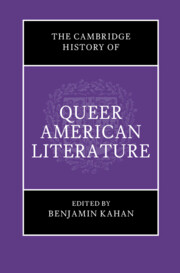Book contents
- The Cambridge History of Queer American Literature
- The Cambridge History of Queer American Literature
- Copyright page
- Contents
- Figures
- Tables
- Contributors
- Acknowledgments
- Introduction
- Part I Synchronic Histories of American Sexuality
- Part II Diachronic Histories of American Sexuality
- Queer Genre
- 17 Queer Historical Poetics and Queer Formalism
- 18 Queer Mythology in American Poetry, 1855–1913
- 19 Funny Emotions
- 20 Queer American Poetry Now
- 21 Queer American Drama
- 22 The Gay Genre
- 23 The Oneiric Golden Age of Gay and Lesbian Pulp
- 24 Queering Desire in American Science Fiction
- 25 Queering Comics Histories
- 26 LGBT Bestsellers
- 27 History Touches Us Everywhere
- Race and the Politics of Queer and Trans Representation
- Space and the Regional Imaginary of Queer Literature
- Part III Queer Methods
- Index
18 - Queer Mythology in American Poetry, 1855–1913
from Queer Genre
Published online by Cambridge University Press: 17 May 2024
- The Cambridge History of Queer American Literature
- The Cambridge History of Queer American Literature
- Copyright page
- Contents
- Figures
- Tables
- Contributors
- Acknowledgments
- Introduction
- Part I Synchronic Histories of American Sexuality
- Part II Diachronic Histories of American Sexuality
- Queer Genre
- 17 Queer Historical Poetics and Queer Formalism
- 18 Queer Mythology in American Poetry, 1855–1913
- 19 Funny Emotions
- 20 Queer American Poetry Now
- 21 Queer American Drama
- 22 The Gay Genre
- 23 The Oneiric Golden Age of Gay and Lesbian Pulp
- 24 Queering Desire in American Science Fiction
- 25 Queering Comics Histories
- 26 LGBT Bestsellers
- 27 History Touches Us Everywhere
- Race and the Politics of Queer and Trans Representation
- Space and the Regional Imaginary of Queer Literature
- Part III Queer Methods
- Index
Summary
Vivian Pollak begins with Whitman’s reputation as a sodomite and pederast in his time and ours. She traces the development of this reputation in his early fiction and in the first editions of Leaves of Grass. Although many of Whitman’s contemporaries agreed that the poet had a “sex handicap,” they disagreed about its nature. Pollak argues such “sex handicaps” open a space for thinking about queer community. She offers a close reading of three Dickinson poems that variously engage the concept of sex handicaps and shows that the heteronormative “Master” motif shrunk Dickinson’s erotic range. Eventually, however, even Robert Frost addressed the search for a historical “Master.” Pollak notes Frost’s early interest in “fairies,” describes his disidentification with his self-destructive father, and highlights his bond with his writerly mother, Belle Moodie Frost. Pollak reads Frost’s 1913 poem “Mowing” as a brilliant analysis of erotic conflict and its partial resolution. Although Frost is not usually recognized as a queer writer, Pollak suggests that a collective struggle with “sex handicaps,” however queerly defined, constitutes an important tradition in American poetry and poetics.
Keywords
- Type
- Chapter
- Information
- The Cambridge History of Queer American Literature , pp. 321 - 344Publisher: Cambridge University PressPrint publication year: 2024



